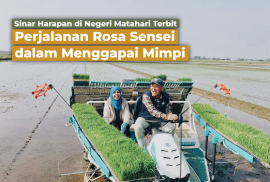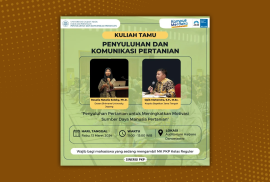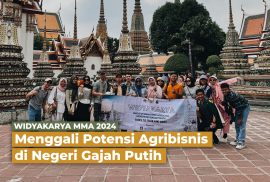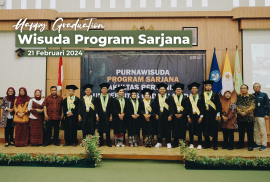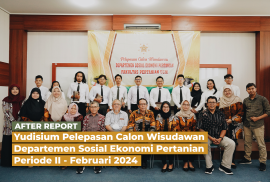Rosalia Natalia Seleky, Ph.D., commonly called Rosa Sensei, is an alumna of the Department of Agricultural Socioeconomics, Gadjah Mada University, class of 2011. Her study struggle has led her to explore the world of education until she is now an Assistant Professor (Young Lecturer) at Shimane University, Japan. From the start, Rosa showed interest in the socio-economic field. Still, because she had a background in Mathematics and Natural Sciences in high school, Rosa finally looked for a major in the Science and Technology group that suited her interests. This led him to embark on an academic journey in the Department of Agribusiness, Faculty of Agriculture, Gadjah Mada University, which ultimately opened the way to exploring knowledge in different parts of the world.
The recent increase in rice prices in several regions in Indonesia has raised concerns among the public. To gain a deeper understanding of this phenomenon, we interviewed Prof. Subejo, S.P., M.Sc., Ph.D., a Professor in the field of Agricultural Extension and Communication from the Department of Agricultural Socioeconomics, Faculty of Agriculture, Gadjah Mada University.
In this interview, Prof. Subejo said that several factors caused the increase in rice prices, as well as their impact on the socio-economic conditions of farmers and society in general.
🎙 Dr. Tedy Dirhamsyah, S.P., MAB
Head of the Research Institute for Industrial and Refreshment Crops
📅 Tuesday, 19 March 2024
🕘 13.00 – 15.00 WIB
📌 bit.ly/KultamEPA1
This Guest Lecture is open to the public and is MANDATORY for EPA Students Class of 2020 as well as students of the Capita Selekta Agricultural Economic Management course. Don’t miss this exciting opportunity!
📆 Wednesday, 13 March 2024
⏰ 11.00-13.00 WIB
📍 Harjono Danoesastro Auditorium, Faculty of Agriculture, UGM
Note:
This guest lecture is MANDATORY for students taking Agricultural Extension and Communication courses.
Prof. Tsuyoshi Sumita
Lecturer of Tohoku University
Moderator:
Rosalia Natalia Seleky, S.P., M.Agr., Ph.D.
Laboratory of Agricultural Economics, Shimane University
📅 Monday, 4 March 2024
⏰ 9 – 11 AM
📌 MMA Auditorium Room
OPEN FOR PUBLIC
** Mandatory for MMA 47 & 48
** Welcome register to EPA, MEP, and S3 agribusiness and agriculture economic
Registration Link:
https://bit.ly/RegristrationGuestLectureMMA
Mrs. Rosalia Natalia Seleky, Ph.D., brings a policy and innovation perspective from the country of Sakura. She enthusiastically shares her experience and knowledge in developing the motivation and skills of agricultural human resources through a targeted and effective extension approach. Meanwhile, Mr. Opik Mahendra, S.P., M.Sc., presented a deeply rooted local perspective. He raised awareness of the importance of extension in building farmers’ abilities and encouraged their enthusiasm in facing the challenges of the ever-evolving times.
This event is not just an intellectual meeting but also an important milestone in strengthening the connection between theory and practice in agriculture. Students are not only given knowledge but also inspiration to contribute significantly to alleviating existing agricultural problems. Not only is it academically relevant, but this activity also significantly impacts achieving the Sustainable Development Goals (SDGs). We are moving towards a more inclusive, sustainable, and competitive vision by empowering agricultural human resources through an extension approach.
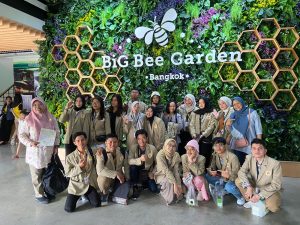
Widyakarya began with a visit to the Big Bee Garden, an educational tourist destination that offers in-depth insight into bee cultivation and pure honey production. Here, students gain new knowledge about the vital role of bees in the ecosystem and purchase high-quality honey products without added sugar. This experience provides a deeper understanding of the potential of the bee industry and its products in the context of agribusiness management.
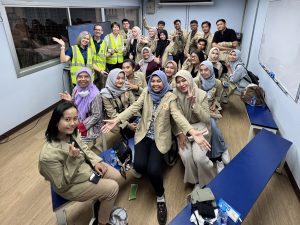
Next, students visited YARA International, a leading company that produces and distributes high-tech fertilizers. Here, they had the chance to visit three exciting locations: distributor partners, farm partners, and bagging factories. Through this visit, students saw firsthand the manufacturing process and applying YARA fertilizer in the field and understood marketing and distribution strategies for modern agricultural products.
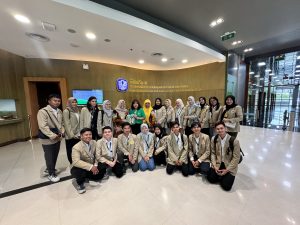
The next visit took students to the Bank for Agriculture and Agricultural Cooperatives (BAAC) Thailand, where they gained in-depth insight into the banking sector’s important role in supporting the agricultural sector’s growth. BAAC Thailand not only provides financial access to farmers but also provides education and assistance to ensure the sustainability of agricultural businesses. This provides a new perspective on how financial institutions can become strategic partners in developing agribusiness.
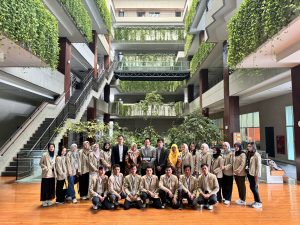
This scientific trip closed with a visit to Kasetsart University, a renowned higher education institution in Thailand. Here, students not only learn about the learning system and campus environment but are also introduced to various aspects of campus life. This opportunity is not only a learning opportunity but also expands networks and intercultural experiences for students.
Overall, this experience not only provides students with new knowledge but also adds in-depth insight into cultural diversity and the natural environment. Widyakarya 2024 will be an unforgettable journey, expanding students’ global horizons in applying agribusiness knowledge and supporting the sustainable development agenda.
At the event, lecturers from Tohoku University, Japan, Prof. Tsuyoshi Sumita, known as Sensei Tsuyoshi, Also present as moderator was Mrs. Rosalia Natalia Seleky, S.P., M.Agr., Ph.D. from the Laboratory of Agricultural Economics, Shimane University, Japan.
Prof. Tsuyoshi discusses Contract Farming in Japan in depth. He explains the concept of community farming, its differences from contract farming, and its history and sustainability in Japan. In the discussion, it is emphasized that Indonesia and Japan have similar challenges in the agricultural sector, especially related to the problem of the age of farmers who tend to be older and the lack of interest of the younger generation in being involved in agriculture.
Community farming in Japan originated from the need for labor during the cultivation process, giving rise to a labor exchange system between farming households. This system allows farmers to use machinery and coordinates the cultivation process and financial turnover. The production results are then marketed collectively through cooperatives.
Prof. Tsuyoshi not only provided an overview of the practice but also inspired the application of a similar concept in Indonesia, considering the country’s great potential in the agricultural sector. The success of community farming in Japan shows that coordination and efficiency can be achieved through this model, especially in terms of costs.
The importance of integrating this topic with the Sustainable Development Goals (SDGs) cannot be overlooked. Practices such as community farming and contract farming in Japan have great potential to support the achievement of several SDGs, especially those related to poverty alleviation, food security, and sustainable economic development.
Thus, this guest lecture provides new insights into the agricultural context and invites us to consider how these concepts can be adapted to achieve sustainable development goals.
In this period, 76 graduates from 8 undergraduate study programs at the Faculty of Agriculture completed their studies. Of this number, the Department of Agricultural Socioeconomics contributed to graduating 12 graduates, 11 of whom came from the Agricultural Economics and Agribusiness Study Program. In contrast, another came from the Agricultural Extension and Communication study program.
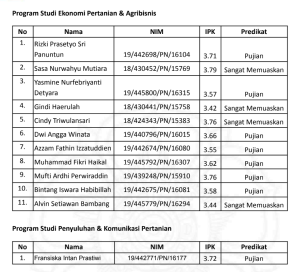
The average GPA of graduates from the Department of Agricultural Socioeconomics who graduated in this period reached 3.64, with an average study period of 4 years and six months. One achievement that we should appreciate is that of Mufti Ardhi Perwiraddin, who emerged as the Best Graduate of the Department of Agricultural Socioeconomics with a GPA of 3.76.
Mufti Ardhi Perwiraddin conveyed his impressions and hopes, “Education is the power of life, and life teaches us how unique we are; for me, the Department of Agricultural Socioeconomics is a comfortable home for learning, growing, and developing. Lecturers with their uniqueness, fast administrative services, as well as colleagues who are diligent and smart. Participating in competition activities, KKN, MBKM, and other learning facilities will be a beautiful, meaningful, and unforgettable experience. Hopefully, the agricultural socio-economic department will become a more beautiful home, beautiful, valuable, and capable of creating future generations that are useful for agricultural development. For friends of the younger generation, remain enthusiastic and active in seeking knowledge because human status will be higher with knowledge. The spirit of fighting, hopefully, will become more kind, active, enterprising, and strong and make both parents proud. Thanks for everything, and good luck.”
As part of our hopes for the future, we hope that future graduates can continue contributing to sustainable development through the Sustainable Development Goals (SDGs) by utilizing the knowledge and experience they gained while at university. Congratulations to all graduates; we hope success always accompanies your future steps.
The event began with a warm welcome from the presenter, then continued with inspiring words from the Head of the Department, Mr. Dr. Tall Handoyo Mulyo, M.Ec. He encouraged the graduates to maintain the excellent name of Gadjah Mada University wherever they are. “Be an empowered individual for the environment and continue to contribute to the progress of society and sustainable development,” he said enthusiastically.
The speech from the UGM Department of Agricultural Socioeconomics graduate, Mufti Ardhi Perwiraddin, added a touch of emotion to the event. Mufti expressed his gratitude for his achievement as the department’s best graduate in this period. “We all have the potential to impact society and the environment positively,” he said enthusiastically.
The UGM Department of Agricultural Socioeconomics is committed to continuing to produce graduates who care about and contribute to sustainable development, especially in the agricultural and food security sectors. The Department of Agricultural Socioeconomics graduates will officially graduate on Wednesday, February 21, 2024. With enthusiasm continuing to burn, let’s continue the struggle to achieve a sustainable vision for a better future. May success and blessings always accompany all of our steps.

